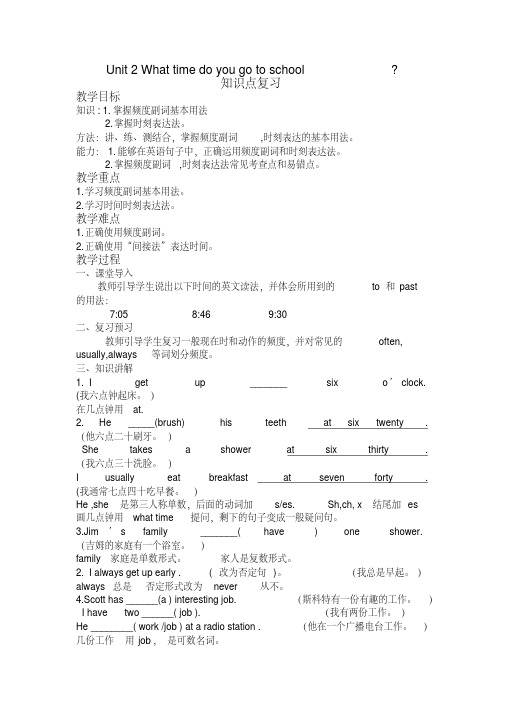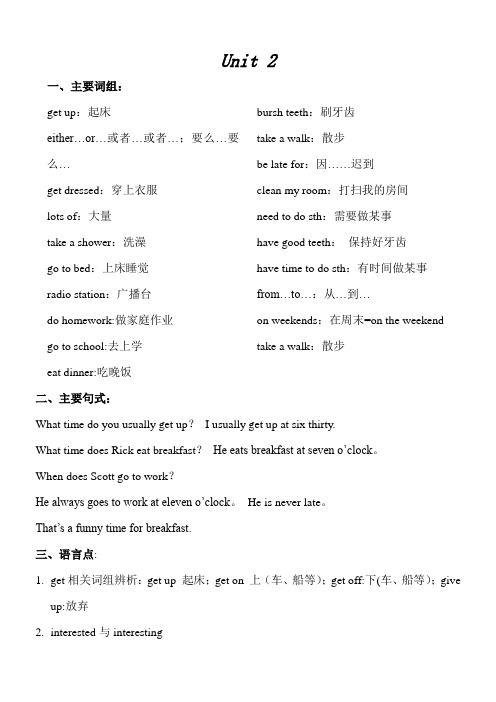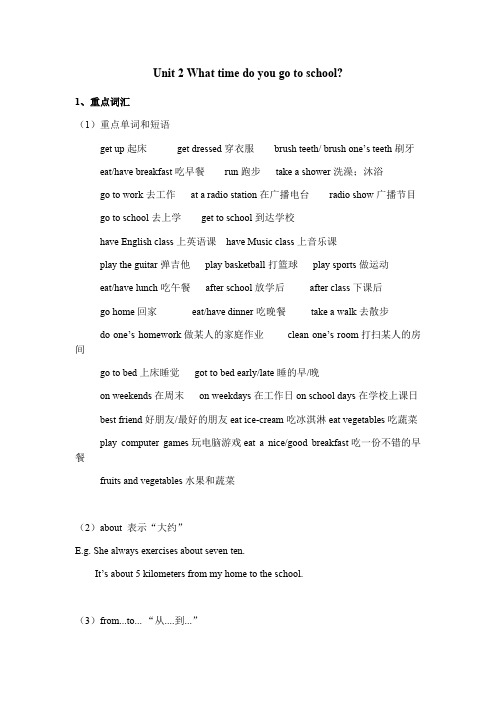七年级下册unitWhattimedoyougotoschool知识点讲解与练习
人教七年级下册Unit2Whattimedoyougotoschool知识点总结

_______( have
)
one
shower.
(吉姆的家庭有一个浴室。 )
family 家庭是单数形式。
家人是复数形式。
2. I always get up early .
( 改为否定句 )。
(我总是早起。 )
always 总是 否定形式改为 never 从不。
4.Scott has ______(a ) interesting job.
and_____________(vegetable )
for lunch.
(十二点钟,她午餐吃许多水果和蔬菜。 )
许多 a lot of = lots of
可数不可数都可以用。
much 修饰不可数名词
many + 可数名词的复数形式。 )
20. After lunch , she sometimes ______(play ) volleyball.
do 是助动词,两个 do 都不能去掉。
用了 does, 后面的动词用原形。
18. I _____watch TV or play computer games in the evening .
(我晚
上要么看电视要么玩电子游戏。 )
Either you or he ________(clean ) the classroom.
for breakfast .
Don ’ t have = have no 没有。
时间 time 是不可数名词名词。
( 我没有许多时间吃早餐。 )
15. He eats a ________(good ) breakfast .
( 他吃好的早餐。 )
I play ping-pong _______(good ).
-What-time-do-you-go-to-school重点总结.doc

Unit 2 一、主要词组:get up:起床either…or…或者…或者…;要么…要么…get dressed:穿上衣服lots of:大量take a shower:洗澡go to bed:上床睡觉radio station:广播台do homework:做家庭作业go to school:去上学eat dinner:吃晚饭bursh teeth:刷牙齿take a walk:散步be late for:因……迟到clean my room:打扫我的房间need to do sth:需要做某事have good teeth:保持好牙齿have time to do sth:有时间做某事from…to…:从…到…on weekends:在周末=on the weekend take a walk:散步二、主要句式:What time do you usually get up?I usually get up at six thirty.What time does Rick eat breakfast?He eats breakfast at seven o’clock。
When does Scott go to work?He always goes to work at eleven o’clock。
He is never late。
That’s a funny time for breakfast.三、语言点:1.get相关词组辨析:get up 起床;get on 上(车、船等);get off:下(车、船等);giveup:放弃2.interested与interesting3. o’clock 的用法:指“…点钟”,用在整点之后。
Eg :six o’clock4. fun 与funny 区别:两者含以上有差别:funny 表示“有趣的,滑稽的",它指的是一种滑稽而可笑的“有趣”,侧重点是让人绝对好玩或发笑。
unit2 what time do you go to school- 七年级英语下册同步必背知

Unit 2 What time do you go to school?七年级英语下册必备知识清单一、词汇知识清单I、课标词汇[注意英译汉]up [ʌp] adv.向上get up起床;站起dress ['dres] v.穿衣服n.连衣裙get dressed穿上衣服brush [brʌʃ] v.刷;刷净n.刷子tooth [tuːθ] n. (pl. teeth[tiːθ])牙齿shower ['ʃaʊə] n.&v.淋浴; n.淋浴器(间)take a shower淋浴;洗澡usually ['juʒuəli] adv.通常地;一般地forty ['fɔː(r)tɪ] num.四十wow [waʊ] interj.(表示惊奇或敬佩)哇;呀never ['nevə] adv.从来;绝不early ['ɜːlɪ] adv.&adj.早(的)fifty ['fɪftɪ] num.五十job [dʒɒb] n.工作;职业work [wɜːk] n.&v.工作station ['steɪʃ(ə)n] n.电(视)台;车站radio station广播电台o'clock adv.(表示整点)……点钟night [naɪt] n.晚上;夜晚funny ['fʌnɪ] adj.奇怪的;滑稽好笑的exercise ['eksəsaɪz] v.&n.锻炼;练习on weekends(在)周末best [best] adj.最好的adv.最好地;最group [gruːp] n.组;群half [hɑːf] n.&pron.一半;半数past [pɑːst] prep.晚于;过(时间)adj.过去的quarter ['kwɔːtə] n.一刻钟;四分之一homework ['həʊmwɜːk] n.家庭作业do (one’s) homework做作业run [rʌn] v.跑;奔clean. [kliːn] v.打扫;弄干净;adj.干净的walk [wɔːk] n.&v.行走;步行take a walk散步;走一走quickly ['kwɪklɪ] adv.很快地either ['aɪðə] adv.或者;也(用在否定词组后)either…or…要么……要么……;或者……或者……lot [lɒt] pron.大量;许多lots of大量;许多sometimes [ˈsʌmtaɪmz] adv.有时taste [teɪst] v.有…的味道;品尝;n..味道;life [laɪf] n.(pl. lives [laɪvz])生活;生命II、语法词汇知其变[注意词性变化]1.dress['dres] v.穿衣服--- adj.dressed穿好衣服的;穿着……衣服的---n.dresser梳妆台;化妆师2.brush [brʌʃ] v.刷;刷净n.刷子---ing形式brushing---pl.brushes3.tooth [tuːθ] n.牙齿--- pl.teethually ['juʒuəli] adv.通常地;一般地ual通常的,平常的5.work [wɜːk] n.&v.工作---3pl.works---ing形式working6.funny ['fʌnɪ] adj.奇怪的;滑稽好笑的---n.fun乐趣,享受7.exercise ['eksəsaɪz] v.&n.锻炼;练习---3pl.exercises---ing形式exercising8.best [best] adj.最好的adv.最好地;最---(原级)adj.good好的,优良的---(原级)adv.well有益的;合理的9.half [hɑːf] n.&pron.一半;半数---pl.halves10.quarter ['kwɔːtə] n.一刻钟;四分之一---pl.quarters11.run [rʌn] v.跑;奔---ing形式running---n.runner跑步者12.clean. [kliːn] v.打扫;弄干净;adj.干净的---ing形式cleaning---n.cleaner清洁工;清洁剂13.walk [wɔːk] n.&v.行走;步行---ing形式walking---n.walker步行者14.quickly ['kwɪklɪ] adv.很快地---adj.quick迅速的,快的15.sometimes [ˈsʌmtaɪmz] adv.有时---adv.sometime某个时候16.life [laɪf] n.生活;生命---pl.livesIII、重点短语知搭配[注意固定短语的英汉互译]get up起床get dressed穿上衣服take a shower洗淋浴radio station广播台on weekends在周末what time什么时间go to school去上学do one’s homework做某人的家庭作业take a walk散步either…or…要么……要么……;或者……或者……lots of…= a lot of很多;大量brush (my) teeth刷(我的)牙get to到达go home回家eat breakfast吃早餐go to work去上班get home到家go to bed上床睡觉at night在晚上be late for迟到IV、核心单词知用法[注意固定短语、句型和词块]Section A1. What time do you usually get up? 你通常什么时候起床?(P. 7)When do you go to work? 你的朋友们什么时候锻炼?(P. 8)(1)what time意为“何时;什么时候”。
Unit2Whattimedoyougotoschool单元知识点人教版七年级英语下册

七年级英语下册Unit 1知识点人教版七下 Unit 2 What time do you go to school?单元知识梳理【Useful expressions】1.what time 几点2.go to school 去上学3.get up 起床4.take a shower 洗淋浴5.brush teeth 刷牙6.get to 到达7.do homework 做家庭作业8.go to work 去上班9.go home 回家10.eat breakfast 吃早饭11.get dressed 穿上衣服12.get home 到家13.either…or…要么…要么…14.go to bed 上床睡觉15.in the morning/afternoon/evening 在上午/下午/晚上16.take a walk 散步17.lots of=a lot of 许多,大量18.radio station 广播电台19.at night 在晚上20.be late for=arrive late for 迟到21.be good for…..对…….有益22.taste good 尝起来好23.do her homework 做她的家庭作业24.have a healthy life 有一个健康的生活方式25.have dinner 吃晚饭26.after that 在那之后27.get home from school 放学回家28.half an hour 半个小时29.live a healthy life 过健康的生活【Target sentences】1.—What time do you usually get up?— I usually get up at six thirty.2.— What time does Rick eat breakfast?—He eats breakfast at seven o’clock.3.— When does Scott go to work?—He always goes to work at eleven o’clock.4.What time do they get dressed?They always get dressed at seven twenty.5.When do your friends exercise?They usually exercise on weekends.6.I don’t have much time for breakfast, so I usually eat very quickly.7.I either watch TV or play puter games.8.At twelve, she eats lots of fruit and vegetables for lunch.9.She knows it’s not good for her, but it tastes good!10.After school, I sometimes play basketball for half an hour.【Language points】1.get dressedget dressed 穿上衣服【用法详解】get dressed为固定短语,表示穿的动作。
七年级下册unitWhattimedoyougotoschool知识点讲解与练习

(3)How+形容词+a/an+单数可数名词+陈述句(主语+谓语)
Howtallatreeitis!多么高的一棵树啊!
4.Afterbreakfastheplays hisguitar,thenhe goesto work.
早餐以后,他练习吉它,然后他去上班了。
Whatterribleweather itis!多么恶劣的天气啊!
注:how也可以引导感叹句,how为副词,在感叹句中修饰动词,形容词或副词:
(1)How+形容词/副词+陈述句(主语+谓语)
How cold it is!多冷啊!How hardhe works!他工作多么努力啊!
(2)How+陈述句(主语+谓语)
姑家, atthestation在火车站.2)朝向,如:lookat me!看我!3)指速度或价格.
如:shebuys the book atagood price她以优惠的价格买了这本书。
3. What afunnytimetoeatbreakfast!在这个时间做早饭是多么有趣的啊!
释: 这是一个感叹句,what意为 多么的,何等的,用于感叹句中,修饰ห้องสมุดไป่ตู้面的单数
用来修饰动词的一般时态。
例如:Wealways getup beforesixo'clock.我们总是六点前起床。
若修饰动词进行时,则有“老是”,“再三地”的意思,带有厌烦、不满、赞美等感情色彩。例如:Youare alwayscoming late.你老是迟到。(含有责备的意思)
Heisalways thinking of others.他总是想着别人。
七年级英语下册Unit2Whattimedoyougotoschool知识点总结(最新整理)

I. 词汇 A) 根据英语释义及首字母提示,完成下列单词拼写。 1. S______ (the last day of a week) 2. o______ (of the clock) 3. h______ (the work a teacher gives a student to do at home) 4. l______ (not early) 5. m______ (time before noon) B) 根据首字母或汉语提示完成各句所缺单词 6. What t______ do you usually get up? 7. I like watching movies (看电影) with my b______ friend. 8. School s______ at nine o’clock. 9. I u______ go to school at half past seven o’clock.
(8)be good for... “对...有好处” be bad for “对...有坏处” E.g. Fruits and vegetables are good for your health.
Eating much ice-cream is bad for your health. (9)be late for.... “迟到...”
E.g. I often play sports before breakfast. Mr. Li usually takes a walk after dinner.
(6)much;many;lots of/ a lot of 都表示“许多”; 区分:much+不可数名词; many+可数名词复数;lots of/ a lot of+可数名
初中英语人教版七年级下Unit 2 What time do you go to school知识点
七年级英语下册Unit2知识点Section A1.Get up 起床2.Go to school 去上学3.Get dressed 穿衣服Dress (名词) 连衣裙 (动词) 穿衣服Put on, wear, dress区别:Put on强调穿衣服的动作Eg: It’s cold outside, please put on your sweater.“外面天气冷,请穿上你的毛衣。
”wear强调穿衣服的状态Eg: The girl wears a sweater today.“这个女孩今天穿了一件毛衣。
”Dress 后面接人,表示给某人穿衣服Eg: The boy is too young to dress himself.“这个小那还太小了不能自己穿衣服。
”4.Brush teeth 刷牙(1)Brush (名词) 刷子Eg: Please pass the brush to me.“请把刷子递给我。
”Brush(动词) 刷Eg: The floor is easy to brush clean.“这个地板很容易刷干净。
”(2)Teeth 是tooth(牙齿)的复数形式5.Eat breakfast/lunch/dinner “吃早/午/晚饭”= have breakfast/lunch/dinner注意:在表示吃早午晚饭时不可加冠词,但当有形容词修饰早午晚饭时可加冠词Have a good breakfast“吃一顿好的早饭”句型:have ... for breakfast/lunch/dinner“早/午/晚饭吃...”Eg: We have bread and milk for breakfast.“我们早饭吃面包和牛奶。
”6.Take a shower= have a shower 洗淋浴7.At six thirty 在六点半在具体某一时刻前通常用介词 at时间表达法:1)采用数词表达时间Eg: six thirty 六点半;eight fifteen 八点十五分2)采用介词past,to表达时间一般说来半个小时以内,常常用介词past,表示“几点过几分”Eg: a quarter past three 三点一刻;half past eight 六点半;ten past two 两点十分半小时过后多用介词to,表示“差几分到几点”Eg: a quarter to three 两点四十五;twenty to four 三点四十3)a. m. 和p. m.A.m. 表示“午前;上午”(午夜12:00后至中午12:00前);p.m. 表示“午后;下午”(中午12:00后至午夜12:00前)。
whattimedoyougotoschool知识点
【Hold fast to dreams. They will come true one day!紧紧抓住梦想,总有一天梦想会成真。
】初一英语(下)Unit2 What time do you go to school一、热点、考点回顾1.重点短语:what time几点,什么时候 go to school去上学 get up起床 take a shower淋浴,洗澡put on穿上 go to work去上班 get to到达 listen to听 get back 归还,取加get home 到家 get go 到达 get for 为某人拿(取)买 get from 从某人/某物那得到……go to bed上床睡觉 get dressed穿上衣服 radio station广播电台 do homework做作业go home回家 lots of=a lot of许多;大量2.口语:(1)What time is it 几点了(2)--What time do you usually get up你通常几点起床--I usually get up at five o’clock. 通常5点钟起床。
(3)--What time does he eat breakfast他什么时候吃早饭--He eats breakfast at seven o’clock. 他七点钟吃早饭。
3.语法知识:对时间提问:What time与when都可以用来提问时间,表示“什么时候”。
提问做某事的具体时间(钟点)时,一般两者可通用;提问事件发生的年份、月份、日期等非钟点性时间时只能用when,而不能用what time。
--What time/When does your mother go to work你母亲什么时候去上班--She goes to work at seven.她7点去上班。
--When will he come back他什么时候回来--He’ll come back tomorrow.他明天回来。
七年级英语下册Unit2Whattimedoyougotoschool短语语法知识点汇总人教版
Unit 2 What time do you go to school 一、基础归纳【教材内容解析】Section A1.get dressed (P. 7)get dressed意为“穿上衣服”,dress用作动词,表示“给(某人)穿衣服”,接宾语时,只能接表示人的名词或者代词。
He can’t dress himself.I usually dress my daughter before I go to work.【拓展】辨析wear, put on和dress2.take a shower (P. 7)take a shower意为“洗淋浴”,相当于have a shower,shower用作名词,表示“淋浴”。
I often take a shower in the evening.I take a cold shower when I feel tired.3.What time do you usually get up, Rick? (P. 7)(1)what time用来询问具体的时间点,表示“什么时候”。
What time do you go to school?(2)usually是频度副词,意为“通常、一般”,在句中作状语,一般位于实义动词之前,连系动词be、助动词或者情态动词之后。
I usually have lunch at school.He usually goes to school by bike.4.I never get up so early. (P. 8)early此处用作副词,表示“很早地”,反义词为late,意为“晚地”。
Please come to school early tomorrow.【拓展】early还可以用作形容词,表示“早的、提前的”,反义词是late,意为“晚的”。
He gets up early to catch the early bus.5.Scott has an interesting job. (P. 8)job用作可数名词,表示“工作”,强调具体的职业或者工作,work表示“工作”时,用作不可数名词,指人们日常生活和工作中从事的体力或者脑力劳动,及各类工作。
七年级英语下册Unit2Whattimedoyougotoschool全部重要知识点(带答案)
七年级英语下册Unit2Whattimedoyougotoschool全部重要知识点单选题1、He gets up very early,so he is late for school.A.alwaysB.usuallyC.neverD.often答案:C句意:他起床起得非常早,所以他上学从不迟到。
always总是,usually经常,never从不,often经常。
根据He gets up very early可知他起得非常早,因此他上学从不迟到,故选C。
2、They got dressed ______ half past six ______ the morning.A.in; onB.on; inC.at; inD.in; at答案:C句意:他们早上六点半就穿好衣服了。
考查介词辨析。
in用于一天中上午、下午或晚上等;on用于具体某一天;at用于具体时刻前。
句中“half past six”表示“具体时刻”,前面使用介词at;句中“the morning”表示“早上”,前面使用介词in。
故选C。
3、I get home ______school at half ______ five.A.after;pastB.from;toC.to;pastD.to;to答案:A句意:放学后我在5:30到家。
考查介词。
after意为“在……之后”,past意为“经过”,from意为“从……”,to意为“到……”。
after school意为“在放学后”,half past five意为“5点半”。
根据句意可知选A项。
4、—_________ do you go to see your grandparents?—On Saturday morning.A.HowB.WhenC.WhereD.Who答案:B句意:——你什么时候去看你的祖父母?——周六上午。
考查特殊疑问词。
How怎么样;When什么时候;Where在哪里;Who谁。
- 1、下载文档前请自行甄别文档内容的完整性,平台不提供额外的编辑、内容补充、找答案等附加服务。
- 2、"仅部分预览"的文档,不可在线预览部分如存在完整性等问题,可反馈申请退款(可完整预览的文档不适用该条件!)。
- 3、如文档侵犯您的权益,请联系客服反馈,我们会尽快为您处理(人工客服工作时间:9:00-18:30)。
释:这是一个由疑问词what time(几点)引导的特殊问句。
其结构:What time +助动词do/does +主语+动词原形,询问某人做某事的具体时间。
例如:what time do you begin class in the morning你们早晨几点开课?注:What’s the time=What time is it也是用来询问时间,意为“几点了”。
用it作答。
例如:What’s the time It’s 7:30.几点了?七点半了。
2.I usually get up at five o’clock. 我通常在五点钟起床。
释:1)句中usually与often 一样都是频度副词,常用于动词be 之后,行为动词之前。
always意思是“总是”、“永远”,表示动作重复,状态继续,中间没有间断,通常用来修饰动词的一般时态。
例如:We always get up before six o'clock.我们总是六点前起床。
若修饰动词进行时,则有“老是”,“再三地”的意思,带有厌烦、不满、赞美等感情色彩。
例如:You are always coming late.你老是迟到。
(含有责备的意思)He is always thinking of others.他总是想着别人。
usually(75%)意为“通常”,着重表示已习惯的动作。
反义词为:unusually。
例如:They usually have four classes in the morning.他们上午通常上四节课。
They usually do some shopping on Sunday.他们通常星期天买东西。
often(50%)意为“时常”、“经常”,表示常常这样,但不总是这样,反义词为:seldom。
例如:She often helps her mother with her housework after school.放学后她常常帮助母亲做家务。
We often go to see our teacher.我们常去看望我们的老师。
sometimes(20%)表示“有时”、“不时”的意思,说明的是偶尔发生的事情或情况。
它的位置比较灵活,可置于句首、句中、句末。
例如:Sometimes I come on foot.有时我步行来。
It is sometimes hot and sometimes cold here.这里有时,热有时冷。
★下面的排列更直观地说明了这几个词的频率的"大小"。
always>usually>often>sometimes>seldom>never2)介词at 常用于具体时刻之前,意义为在……,如:at 5:00 在5:00钟。
o’clock=of the clock 表示……点钟,其前通常是整点,如:six/seven/eig ht o’clock 六/七/八点钟。
注:介词at 除了指时间以外,还可指1)人物的所在之处,如:at my unc le’s home 在我姑姑家, at the station 在火车站.2)朝向,如:look at me!看我!3)指速度或价格.如:she buys the book at a good price 她以优惠的价格买了这本书。
3. What a funny time to eat breakfast!在这个时间做早饭是多么有趣的啊!释:这是一个感叹句,what 意为多么的,何等的,用于感叹句中,修饰后面的单数或复数名词,其句式结构为:(1)What a/an +形容词+单数名词+主语+谓语!what a good girl she is!她是多么好的女孩啊!(2)What+形容词+可数名词复数+主语+谓语!What good girls they are!她们是多么好的女子啊!(3)What +形容词+不可为名词+主语+谓语!What terrible weather it is! 多么恶劣的天气啊!注:how也可以引导感叹句,how 为副词,在感叹句中修饰动词,形容词或副词:(1)How+形容词/副词+陈述句(主语+谓语)How cold it is! 多冷啊!How hard he works! 他工作多么努力啊!(2)How+陈述句(主语+谓语)How he loves his son! 他多么爱他的儿子啊!(3)How+形容词+a/an+单数可数名词+陈述句(主语+谓语)How tall a tree it is! 多么高的一棵树啊!4.After breakfast he plays his guitar ,then he goes to work.早餐以后,他练习吉它,然后他去上班了。
释:1)go to work的意思是“去上班”,work是不可数名词,其前面不加冠词,该短语同go to school“去上学”。
例如:They go to work in their cars =by car. 他们开车去上班。
We go to school by bus.我们乘公共汽车上学。
get to work,he takes the number17 bus to the Sai Te Hotel.为了工作,他乘坐17路公交车到赛特宾馆。
释:动词take在此时“乘坐”的意思;而by也有“乘坐”的意思,但它是介词。
比较:He often takes the bus to work.他经常乘公交车上班。
He often go to work by bus.注:动词词组作谓语,介词短语作状语。
works all night.他工作一整夜。
释:all修饰一个表示时间的单数可数名词,表示整个这一段时间。
例如:Don’t read all day.不要整天看书。
He stays at home all morning.他整个上午呆在家。
love to listen to him.人们喜欢听他的!释:love to do sth.=like to do much.喜欢做某事,强调具体活动。
而love doing sth.=like doing sth. very much则强调习惯。
例如:Do you come out to play with me你喜欢出来和我玩吗?I like watching TV.我喜欢看电视。
与listen to释:hear意为“听见”,表示听的结果,而liste n to则表示“听”,强调的是“听”的动作。
如:Let’s listen to the music. 咱们听音乐吧!We listen but don’t hear.我们听了,但什么也没听见。
9. He gets home at 7:00,and he watches morning TV.他七点钟回家,然后看早见新闻。
释:1)句中get 意为“到达”,后接地点名词时,要加介词to,后接副词时,不能加to,例如:She gets to school at six o’clock.她六点钟到校。
注:home 是一个副词,所以其前不能加介词to,但home也可作名词,这时其前有物主代词时,可以加to,例如:She gtes to her home at eight o’clock.她8点钟到家。
Can you get there at eight tomorrow morning 明天上午八点你能到那儿吗?2)句中morning news 表示早间新闻,其中news 是一个不可数名词。
例如:a piece of news 一条新闻,two pieces of news两条新闻。
Watch……On TV 表示通过电视看……节目。
例如:We often watch football game on TV. 我们经常通过电视看是球赛。
you think what his job is?你能想到他的工作是什么吗?释:这里what his job is表示“他的工作是什么”,其中,what his job I 作think的宾语。
英语中类似的表达很多,它们在句中可充当主语、宾语、表语等。
例如:What she says is very good.她说得很好。
(作主语。
注意,谓语动词要用单数。
)The book is just what you want.这本书正是你想要的。
(作表语)I don't know what you say.我不懂你说的话。
(作宾语)time is it?-几点了?-It’s eight thirty. 八点三十分。
释:本句是就具体时刻进行提问的,what time 意为“几点”,这是特殊问句,它的同义句为:What’s the time /What time is it by your watch 在回答这个句子时,要用It’s +钟点。
注:英语时刻的表达法:顺读法和逆读法。
顺读法:钟点数+分钟数。
例如:4:25→four twenty-five,6:58→six fifty-eight,7:00→seven o’clock说明:这种表达不论分钟数是多少,均可使用。
逆读法:分钟为+介词to/past+钟点数,可分两种情况:1)分钟为不超过半小时,用分钟数+past(/pa:st/过)+钟点数。
例如:4:23→twenty-three past four,5:19→n ineteen past five.2)分钟数超过了半小时,用(所差的)分钟的+to+(下一个)钟点为。
例如:7:31→twenty-nine to eight,10:58→two to eleven说明:在逆读法中分钟数逢“五”逢“十”可省略minute(s)。
否则应加上。
当然,英语习惯上把十五分钟(fifteen)称作一刻a quarter,三十分钟(thirty)称为half/half,因此10:30,可以用两种表达方式,half past ten,ten thirty。
for your letter.感谢你的来信。
释:thanks for… 表示“因…而感谢某人”。
for是介词,后跟名词,代词宾格或者动名词。
例如:Thanks for your help. 感谢你帮助我。
Thanks for telling me the good news.谢谢你告诉我这好消息。
13. Do you want to know about my morning?你想知道关于我的早晨吗?释:1)该句中want to do…句型。
表示“想要做某事”,该短语中want为及物动词,后面的to do 是不定式(英语中把to+动词称为不定式)作want的宾语,不定式符号不可以省略。
